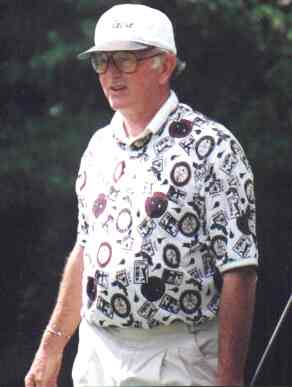

CAREY G. MUMFORD PROFESSIONAL SKETCH
Rounding out a professional career of more than fifty years, primarily in hospital chaplaincy, with extensive investment in counseling, education and human services, Carey Mumford's last 15 have been directed toward helping with the development of the knowledge and skill of those who manage, teach and play the game of golf. The environment changed, but his mission remained the same.
Along with five years of human resource development for a major Sunbelt resort/recreation developer, where he was responsible for training management and sales staff he was often sought out by golf professionals, club managers and others associated with the game for help with their various tasks, particularly those requiring the understanding of human behavior and the skills of self-management and stress reduction.
At the invitation of the PGA of America, and from the program's inception, he served on the faculty of their Advanced Business School until it was discontinued in favor of Stanford U's creation of a GPT program. He remains part of the continuing education program. In addition, he conducts playing and teaching clinics and workshops across the country and in Canada, and regularly coaches amateur and professional players, assisting them with the mental skills that influence building and playing the game.
He also continues to assist corporate groups with both systems and human resources issues, concerns and developmental needs.
Together with PGA Professionals Tim Tague of Tague Golf in Indianapolis, IN and Larry Shute of Crossville, TN, KeyGolf was created, with locations in Indianapolis (KeyGolf North) and Crossville (KeyGolf South), dedicated to learning, teaching and playing in the context of balance in the mental and physical aspects of the game, and combining the principles and basic methodologies required both by sports (golf, in particular) and management behaviors and practices. Both Tague and Shute are Life members of PGA and Shute is a Master professional.
Currently, Carey Is also the Director of Game enhancement for Bird Golf Academy with sites in Denver, Phoenix, Crossville, and coming to Florida and California. He was invited to be a featured contributor to the 2000 official guide to Junior Golf - "Golf, The Game for Life," with his monograph on "Reaching the Fourth Dimension in Golf."
Mumford has also taught and coached in PGA Junior schools in Florida, Tennessee, North Carolina, California and Montana and college golf programs at Eastern Kentucky, Tennessee Tech, Brevard Community College, West Point, Louisville, Vanderbilt and Miami, as well as working with individual coaches and players from other schools.
In their special issue on the mental game in 1990, Golf Magazine recognized him among the top dozen golf psychologists in the country, and Golf World Magazine devoted two pages to his second book (The Double Connexion) in the Pro-Report section of their June 19, 1992 issue.
His work is extensively used in books by Michael Hebron ("The Art and Zen of Learning Golf") and Phil Ritson ("Golf Your Way"), both of whom are listed among the top 100 golf teachers in the country. Mumford's work is also the content of the fourth tape in the Ritson series called "The Encyclopedia of Golf," as well as the core of mental game teaching at all of the Phil Ritson/Mel Sole Golf Schools around the country.
His unique approach to the mental game has earned wide acceptance among both US and Canadian PGA golf professionals, largely because it goes beyond "what" ought to happen and shows "how" to do it. By integrating principles of behavior, psychology and physiology, and removing unnecessary complications, he gives the teacher and player "user-friendly" resources to reshape widely held, though misleading, notions that have unwittingly influenced players to "shoot themselves in the foot."
The two books he has written, GOLF'S BEST KEPT SECRET and THE DOUBLE CONNEXION, describe the context of "playing the game within yourself" and the natural principles and processes essential to balance and integrate mental and manual skills, so players can move naturally, and without hindrance, from the practice tee to the golf course. The applications to life and work are equally present also. It was the cross-currents of common denominators in these seemingly dissimilar arenas that stimulated both books.
Carey Mumford is a graduate of Wake Forest University and Colgate-Rochester Divinity School. His strong training and counseling background, balanced and supported by his thorough familiarity with physiological principles, have allowed him to understand the mutual effect of mind-on-body and body-on-mind that touches everything we do, and to integrate the basic principles into an orderly process for learning, teaching and playing the game. The same is true of his approach to management development and training.
Over the past fifteen years, he has faced more than 22,000 of the Class A Member Professionals of the PGA, conducted in excess of 200 clinics for amateurs and professionals in 30 states and Canada, and worked individually with over 100 players on the PGA, LPGA, Seniors, Nike, TC Jordan, Hooters, Futures, and Mini Tours.
His oldest
son is a Golf Professional in Charleston, SC and his youngest was
Captain of the golf team at the United States Military Academy at
West Point.